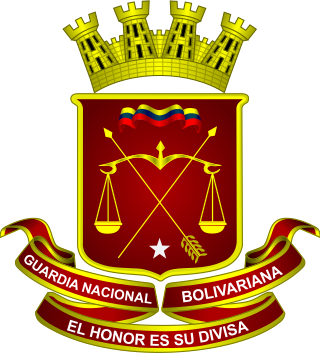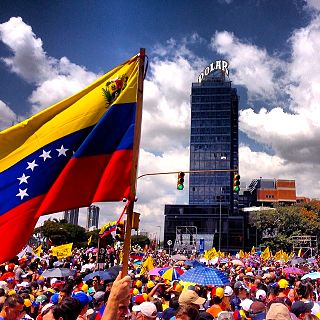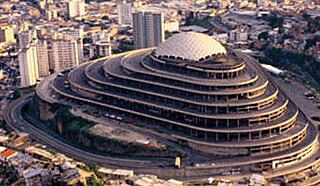
Carlos Alfonso Ortega Carvajal is a former union and political leader in Venezuela. Ortega, then head of Fedepetrol, the oil workers union, was elected leader of the Confederación de Trabajadores de Venezuela (CTV) union federation in 2001. He played an important role during the Venezuelan general strike of 2002–2003, resulting in a 16-year prison term. Ortega ultimately escaped from prison on 13 August 2006.

Leopoldo Eduardo López Mendoza is a Venezuelan opposition leader. He co-founded the political party Primero Justicia in 2000 with Julio Borges. López was elected mayor of the Chacao Municipality of Caracas in the regional elections held in July 2000. He is the National Coordinator of another political party, Voluntad Popular, which he founded in 2009.

The Bolivarian National Guard of Venezuela, is a gendarmerie component of the National Armed Forces of Venezuela. The national guard can serve as gendarmerie, perform civil defense roles, or serve as a reserve light infantry force. The national guard was founded on 4 August 1937 by the then President of the Republic, General-in-Chief Eleazar López Contreras. The motto of the GNB is "El Honor es su divisa", slightly different from the motto of the Spanish Civil Guard "El Honor es mi divisa".

Raúl Isaías Baduel was a Venezuelan politician, general, and defense minister under President Hugo Chávez. He was a member of Chavez' MBR-200, joining in December 1982.

Antonio José Ledezma Díaz is a Venezuelan lawyer, opposition politician and former political prisoner. After unsuccessfully challenging for the leadership of Democratic Action in 1999, he founded a new party, the Fearless People's Alliance.

The record of human rights in Venezuela has been criticized by human rights organizations such as Human Rights Watch and Amnesty International. Concerns include attacks against journalists, political persecution, harassment of human rights defenders, poor prison conditions, torture, extrajudicial executions by death squads, and forced disappearances.
Popular Will is a political party in Venezuela founded by former Mayor of Chacao, Leopoldo López, who is its national co-ordinator. The party previously held 14 out of 167 seats in the Venezuelan National Assembly, the country's parliament, and is a member of the Democratic Unity Roundtable, the electoral coalition that held a plurality in the National Assembly between 2015 and 2020. The party describes itself as progressive and social-democratic, and was admitted into the Socialist International in December 2014. The party was formed in reaction to complaints of infringements of individual freedom and human rights on the part of the government of the Venezuelan president Hugo Chávez and his successor, Nicolás Maduro. The party attempts to bring together Venezuelans of various backgrounds who consider Chavismo oppressive and authoritarian. Popular Will self-identifies itself as "a pluralist and democratic movement" that is committed to "progress", which it defines as the realization of "the social, economic, political, and human rights of every Venezuelan." The party says its "fundamental pillars" are progress, democracy, and social action.
Crime in Venezuela is widespread, with violent crimes such as murder and kidnapping increasing for several years. In 2014, the United Nations attributed crime to the poor political and economic environment in the country—which, at the time, had the second highest murder rate in the world. Rates of crime rapidly began to increase during the presidency of Hugo Chávez due to the institutional instability of his Bolivarian government, underfunding of police resources, and severe inequality. Chávez's government sought a cultural hegemony by promoting class conflict and social fragmentation, which in turn encouraged "criminal gangs to kill, kidnap, rob and extort". Upon Chávez's death in 2013, Venezuela was ranked the most insecure nation in the world by Gallup.

In 2014, a series of protests, political demonstrations, and civil insurrection began in Venezuela due to the country's high levels of urban violence, inflation, and chronic shortages of basic goods and services. Explanations for these worsening conditions vary, with analysis blaming strict price controls, alongside long-term, widespread political corruption resulting in the under-funding of basic government services. While protests first occurred in January, after the murder of actress and former Miss Venezuela Mónica Spear, the 2014 protests against Nicolás Maduro began in earnest that February following the attempted rape of a student on a university campus in San Cristóbal. Subsequent arrests and killings of student protesters spurred their expansion to neighboring cities and the involvement of opposition leaders. The year's early months were characterized by large demonstrations and violent clashes between protesters and government forces that resulted in nearly 4,000 arrests and 43 deaths, including both supporters and opponents of the government. Toward the end of 2014, and into 2015, continued shortages and low oil prices caused renewed protesting.

Lilian Adriana Tintori Parra is a Venezuelan activist, athlete, and television and radio host. Tintori is married to Leopoldo López, a Venezuelan politician sentenced in 2015 to nearly 14 years in prison for inciting violence during street protests the year before. She has also led groups who have opposed the government of Venezuelan President Nicolás Maduro.

The 2014 Venezuelan protests began in February 2014 when hundreds of thousands of Venezuelans protested due to high levels of criminal violence, inflation, and chronic scarcity of basic goods because of policies created the Venezuelan government. The protests have lasted for several months and events are listed below according to the month they had happened.
Iván Antonio Simonovis Aranguren is a Venezuelan criminal science expert and security consultant, who served as security chief during the Llaguno Overpass events of April 2002 in Caracas.

In 2014, a series of protests, political demonstrations, and civil insurrection began in Venezuela due to the country's high levels of urban violence, inflation, and chronic shortages of basic goods attributed to economic policies such as strict price controls. Mass protesting began in earnest in February following the attempted rape of a student on a university campus in San Cristóbal. Subsequent arrests and killings of student protesters spurred their expansion to neighboring cities and the involvement of opposition leaders. The year's early months were characterized by large demonstrations and violent clashes between protesters and government forces that resulted in nearly 4,000 arrests and 43 deaths, including both supporters and opponents of the government.

On 14 April 2013, Nicolás Maduro was elected President of Venezuela, narrowly defeating opposition candidate Henrique Capriles with just 1.5% of the vote separating the two candidates. Capriles immediately demanded a recount, refusing to recognize the outcome as valid. Maduro was later formally inaugurated as President on 19 April, after the election commission had promised a full audit of the election results. On 24 October 2013, he announced the creation of a new agency, the Vice Ministry of Supreme Happiness, to coordinate all the social programmes.

The 2017 Venezuelan protests began in late January following the abandonment of Vatican-backed dialogue between the Bolivarian government and the opposition. The series of protests originally began in February 2014 when hundreds of thousands of Venezuelans protested due to high levels of criminal violence, inflation, and chronic scarcity of basic goods because of policies created by the Venezuelan government though the size of protests had decreased since 2014. Following the 2017 Venezuelan constitutional crisis, protests began to increase greatly throughout Venezuela.

Torture in Venezuela has been a consistent phenomenon throughout its history. Various dictatorships from the Spanish colonial era into the twentieth century utilized torture against common criminals and political opponents. In the twentieth century, torture was common during the dictatorships of Juan Vicente Gómez and Marcos Pérez Jiménez. Torture also took place occasionally during Venezuela's democratic period, particularly during social outbursts, such as during the Caracazo and the 1992 coup attempts.

The 2019 Venezuelan protests were a collection of protests that were organized, since 11 January, as a coordinated effort to remove Nicolás Maduro from the presidency. Demonstrations began following Maduro's controversial second inauguration, developing into a presidential crisis between Maduro and National Assembly president Juan Guaidó. The protests also included counter-demonstrations organized by those who support Maduro.

On 30 April 2019, during the Venezuelan presidential crisis, a group of several dozen military personnel and civilians joined Juan Guaidó in his call for the removal of Nicolás Maduro as part of what he labeled "Operation Freedom". Reuters reported an "uneasy peace" by the afternoon of 30 April. During the unrest, opposition leader Leopoldo López was freed from house arrest after being imprisoned for five years. Manuel Cristopher Figuera, the head of the Bolivarian Intelligence Service, denounced the Maduro government and was dismissed from his position before going into hiding. At least 25 military men who opposed Maduro sought asylum at the Brazilian embassy in Caracas.

Golpe Azul, also known as Operation Jericho, was an accusation by the Venezuelan government that resulted in the arrest of several people, including the metropolitan mayor of Caracas Antonio Ledezma. The accusation consisted in an alleged coup d'état plan against the presidency of Nicolás Maduro, which reportedly would take place on 12 February 2015 and would have several targets in Caracas. The name of the plan refers to the blue uniform of the Venezuelan Air Force in which several suspects were officers.













